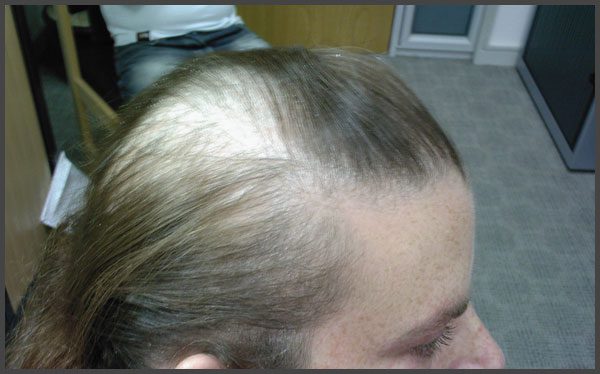Table Of Content

Other treatments, such as light therapy, may be needed to help control psoriasis. For example, hair texture that requires a reduced frequency of hair washing thereby renders daily medicated shampoos unsuitable. Once weekly washing in conjunction with daily application of a topical corticosteroid in a vehicle compatible with preferred hair styling practices may be more acceptable. Examples of alternative therapies used by people with psoriasis include special diets, vitamins, acupuncture and herbal products applied to the skin.
How does scalp psoriasis affect my body?
One of the symptoms of psoriasis is lesions or scales that can be very itchy. Scratching these can cause even more irritation and cause the hair to fall out. Furthermore, when scales peel off, they can dislodge any attached hair. Also, after you shampoo, try a good conditioner to seal in moisture. Remember that anytime you put something on to treat your psoriasis, gently rub it onto your scalp instead of your hair.
How Is Scalp Psoriasis Treated?
If you have any of these symptoms, see your doctor or dermatologist. They may simply take a look or do a skin biopsy to rule out similar conditions like seborrheic dermatiti s. On darker skin tones, scalp psoriasis may have purple undertones with gray scaling. Traction alopecia is the result of environmental factors, such as wearing your hair in tight hairstyles, Agbai says.
Eczema vs. Scalp Psoriasis
The good news (for skin psoriasis patients, at least) is that you can treat two birds with one stone. To treat nail psoriasis specifically, she says injections of low-dose steroids are often given near the affected nail. Depending on the case, Dr. Engelman may recommend retinoids to “address nail separation and discoloration” and vitamin D derivatives that fight against buildup under the nail. Once you find a treatment that works for you — and stick to it with consistency — it can take six months or more to see an improvement, Dr. Engelman says. Healthcare providers recommend beginning treatment with 20 to 36 half-hour sessions three times a week, then switching to once weekly. Most versions are given in a clinic, so travel can also take time.
What questions should I ask my healthcare provider?
These might include phototherapy, oral drug or biologic treatments, and mind/body approaches. You and your health care provider will choose a treatment approach based on your needs and the type and severity of your psoriasis. You'll likely start with the mildest treatments — topical creams and ultraviolet light therapy (phototherapy). Then, if your condition doesn't improve, you might move on to stronger treatments. Scalp psoriasis is psoriasis that develops on the scalp. Psoriasis may also disrupt your sleep and harm your self-esteem.

Around 45–56% of people with psoriasis have scalp psoriasis. However, up to 90% of people with psoriasis can experience scalp psoriasis during their lifetime. Symptoms of scalp psoriasis may include dry, scaly, and itchy skin plaques. These may appear red on lighter skin tones or purple and gray on darker skin tones. It may take up to eight weeks or longer for your symptoms to start going away.
Does Beyoncé Have Psoriasis? Pop Icon Reveals While Addressing 'Deeply Personal' Hair Journey - PINKVILLA
Does Beyoncé Have Psoriasis? Pop Icon Reveals While Addressing 'Deeply Personal' Hair Journey.
Posted: Tue, 20 Feb 2024 08:00:00 GMT [source]
Other factors, such as family history, also help a doctor make a more accurate diagnosis. The most common symptom of scalp psoriasis is small red patches that appear on the scalp. These patches may be itchy, scaly, and may even bleed due to frequent scratching. In some cases, patches may join together to create larger scales that can cover the entire scalp. Scalp psoriasis can also cause temporary or permanent hair loss. While this may not be a significant concern for some, it can be distressing for others who may experience a loss of confidence or self-esteem as a result.
You may need to avoid certain hair treatments or change your scalp psoriasis treatment plan. Systemic medications are drugs that work throughout a person’s body. They’re prescribed only in severe cases or when scalp psoriasis fails to respond to other treatments.
Relaxation Therapy
People can receive this light therapy in hospitals and other clinical centers. Usually, a dermatologist provides the treatment, which may take place three times a week for 6–8 weeks or until the psoriasis has cleared to an acceptable degree. Psoriasis is thought to be an immune system problem that causes skin cells to grow faster than usual. In the most common type of psoriasis, known as plaque psoriasis, this rapid turnover of cells results in dry, scaly patches. If a medical examination is not conclusive, a skin biopsy can be performed to definitively diagnose scalp psoriasis. A small piece of skin tissue is taken from the scalp and tested for abnormal skin cells.
“I can’t put my hair in a ponytail because the psoriasis is all around my hairline,” added another. DermNet does not provide an online consultation service. If you have any concerns with your skin or its treatment, see a dermatologist for advice. DermNet does not provide an online consultation service.If you have any concerns with your skin or its treatment, see a dermatologist for advice. Hand-held devices (UV combs) can directly deliver light to your scalp.
“The primary goal here is to seek treatment and help manage your scalp psoriasis to decrease the possibility of hair loss,” says Dr. Warren. The most common treatments for mild cases are medications that you put directly on your scalp. If you have a more severe case or have psoriasis elsewhere on your body, you may need a medication that treats your whole body. It can take a couple of months or longer to get more severe dandruff under control. Once you do, you may be able to keep it from flaring with special shampoos or moisturizers. Scalp psoriasis has the same causes as psoriasis in general.
For example, you might use one or more topical creams with phototherapy or oral medication like methotrexate. Certain biologics may be a better choice if you have certain medical conditions. For example, Humira or Cosentyx might be good choices if you have psoriatic arthritis and psoriasis symptoms.
For example, you wouldn’t use more than one biologic or more than one type of phototherapy at the same time. People with moderate to severe psoriasis may want to explore oral drug therapies. These drugs are less expensive than newer biologic therapies, and some insurance companies may require that you try them before they cover a biologic treatment.
If you’re diagnosed with scalp psoriasis, it’s important to keep an eye out for other conditions. Talk with a healthcare provider if you develop new symptoms that don’t seem related to psoriasis. It is important to seek medical attention if you suspect you have scalp psoriasis. Your dermatologist can provide proper diagnosis and treatment options to manage your symptoms and prevent potential complications. Your treatment plan will aim to provide symptom relief and prevent complications, such as hair loss.













